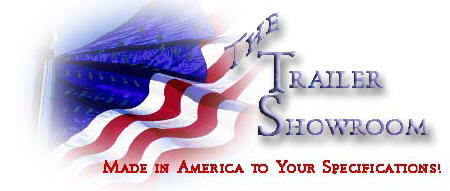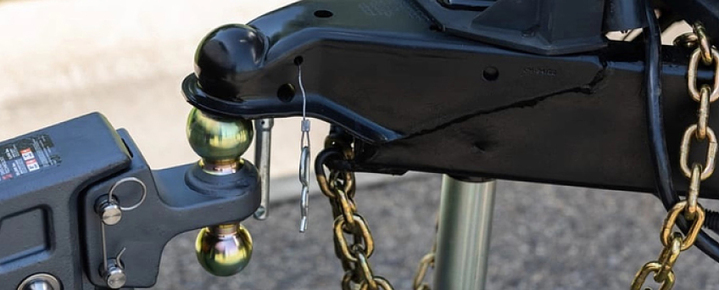A hitch is essential to connect the trailer to your towing vehicle. It means trailer hitch safety is also crucial to maintain a secure vehicle-trailer connection, ensuring stress-free towing.
Disconnection of the hitch means the trailer gets disconnected from the towing vehicle. This can lead to accidents, harming the cargo, trailer, and other vehicles or pedestrians on roads. Such a disconnection can occur due to improper hitch installation, a mismatched hitch-trailer connection, or the use of damaged or worn-out hitch parts.
To avoid such situations where the hitch disconnects from the trailer, you must know the basics of trailer hitch safety. You must also create a checklist mentioning the pre-towing safety measures and follow them diligently before every transit operation. It is also crucial to be aware of the common mistakes that cause hitch-trailer disconnect.
Don't be overly stressed. Our blog explains all these aspects related to trailer hitch safety, recommends a checklist, and mentions avoidable mistakes to ensure a safe, stress-free, and successful towing operation.
Understanding the Importance of Hitch Safety
A hitch connects your trailer to the towing truck. Since it is a connection that aligns the trailer to the vehicle, it must always remain attached during the journey. If it disconnects or the connection is not secure, it can cause disaster. And disaster means loss of lives, unsuccessful towing, or damaged trailer and/or vehicle.
To avoid these situations, understand that secure coupling is non-negotiable. If not taken care of, it can lead to risks of hitch disconnects or failures. The primary reasons for this disconnect or damage can include: improper installation, in-built errors, excess of cargo weight, faulty hitch design, or lack of timely maintenance. Whatever the reason for the hitch disconnect is, it is your duty to prevent such situations by complying with the towing safety tips.
Before all this, the foremost requirement is to search for the perfect trailer hitches for your trailer. It can be a bumper pull, gooseneck, fifth wheel, receiver, pintle, or any other. Just make sure that you check their compatibility with the trailer. For this, you must confirm the hitch class, the trailer's towing capacity, alignment with the towing vehicle, and the cargo weight distribution.
Pre-Towing Safety Checklist
Once you have found the perfect hitch that fits your trailer and vehicle, you must ensure the following safety measures before towing:
Secure Coupler Lock
Check if your receiver, coupler, or their connection has any damage, rusting, loose bolts, or cracks; if yes, replace or repair. Greasing of the hitch ball and coupler is also critical to minimize friction that can lead to wear and tear. Once you attach them, confirm the lock multiple times before starting the towing operation.
Safety Chains
Critical connections, like that of a trailer and towing vehicle, need a backup solution to confirm safe locking after the hitch. Safety chains ensure the connection is not detached if the hitch detaches or disengages accidentally. You must use the crisscross technique in chains for extra security.
Wiring & Lights
Sudden weather changes can affect your driving, like losing visibility due to fog, slippery roads due to rain, or snow. In such cases, you do not want to be stuck in the middle of the road with cargo still to be towed. Before your hauling operation, you must assess the proper functioning of brake lights and wiring, trailer lights, and turn signals. Inspect the tire pressure of the vehicle and trailer to prevent blowouts.
Load Distribution
For proper and even weight distribution, load heavier items near the trailer tongue to have more weight at the front of the axle. You can also use a weight distribution hitch to balance the weight evenly. It is also necessary to secure the cargo with straps, nets, or tie-downs to prevent cargo shift during transit.
Common Mistakes That Lead to Hitch Disconnects
Despite complying with the safety checklist, some built-in hitch problems can cause disconnects. You must be wary of some common mistakes and avoid them to prevent hitch disconnects:
- Incorrectly selecting a hitch class for the load weight in the trailer can lead to the disconnection of the hitch, potentially causing accidents.
- Inappropriate hitch installation without professional assistance can also result in hitch disconnects.
- Faulty design or manufacturing process of the trailer hitch can lead to built-in defects and incorrect functioning, leading to disconnects or failure.
- Misalignment between the hitch receiver and trailer coupler can cause the hitch's wear and tear, leading to disconnection.
- Too high or too low trailer tongue due to height misalignment leads to an imbalanced weight distribution, causing hitch disconnects.
- A trailer or vehicle's sudden tire blowout means the weight pressure falls on the hitch, causing a possible detachment.
- Overloading the hitch beyond its rated capacity is another trailer hitch safety concern that can loosen or break the hitch connection with the vehicle or trailer.
- Using incorrectly-sized pins or clips that do not match the hitch's specifications can wear out, bend, or loosen their grip, causing failure of the hitch connection.
- Aging or deterioration of the wiring, hitch ball, plugs, or coupler due to the absence of timely maintenance and repair can loosen the hitch connection.
- The absence of safety chains, using worn or damaged chains, or their improper connection can also cause hitch disconnects, result in complete trailer disconnection from the tow vehicle, especially in rough terrain and off-roading.
- The lack of regular and proper maintenance of hitches and their connecting accessories, along with timely quality checks to ensure that they do not disconnect during towing.
- Incorrect hitch ball size will lead to trailer disconnection issues. For example, if you tow a small trailer that utilizes a 2" hitch ball, and then later tow a larger trailer that uses a 2 5/16" hitch ball, and you forget to switch from the 2" ball that you used with the smaller trailer to a 2 5/16" ball, your trailer will most likely disconnect from the tow vehicle at some point along your trip, causing damage to your trailer, tow vehicle, and possibly to other vehicles and people in your path.
Helpful Reads:
How to Choose the Right Enclosed Trailer Hitch for Your Trailer and Towing Vehicle
13 Smart Business Uses for a Custom Cargo Trailer
Types of Trailers Explained: The Ultimate Guide to Picking the Perfect One for Your Hauling Needs
Conclusion: Trailer hitch safety to prevent accidents
Trailer hitch safety is essential to ensure a safe, efficient, and smooth drive. Ignoring this aspect can lead to hitch disconnections, wear and tear, or uneven weight distribution. And all these can cause accidents, resulting in cargo damage and harm to lives.
To prevent these situations, checking the hitch quality when buying it is crucial. Also, check the connection before the towing operation. When buying, you must check the hitch class and height, align with trailer and vehicle requirements, and have proper accessories for connection. While connecting, match the height, maintain even balance, tighten the link, and use safety chains. After towing, you must ensure proper maintenance to prevent early damage and a short lifespan.
If you follow these guidelines and best practices proactively, you can tow securely without the risk of hitch disconnect. If you are looking for high-quality hitches or trailer-hitch combos, Trailershowroom.com is the preferred place. We offer high-quality hitches and trailers, along with proper guidance on the right fit.
Stay in control of your truck-hitch-trailer connection when towing. Explore our wide range of trailer-hitch combo options for a safe journey.
FAQs
-
Q1: Is it difficult to apply the brakes when using a high-class hitch?
It's difficult to stop the heavy vehicle after applying the brakes when you are towing a heavy load. The hitch class does not have to do anything with it. But using a Class 1 or 2 hitch for heavy-weight towing makes braking challenging. The weight increases the braking distance, due to which the vehicle takes more time to stop. Driving at a slow or medium pace is recommended, so you can stop easily when the brakes are applied. Always use a high-quality electronic brake controller when towing heavy loads.
-
Q2: Who is responsible for the hitch failure?
The hitch failure responsibility lies with the following persons:
- Manufacturers, if the product is faulty
- Cargo loaders, if they overload or are unable to manage proper weight distribution
- Truck driver, if the hitch connection was not checked or connected properly, or if overspeeding
- Mechanics or repairers, if it was not repaired properly
- Owner, if the hitch, trailer, and vehicle are not checked pre-towing, or if you forget regular maintenance
-
Q3: How can I avoid overloading the hitch?
An overloaded hitch can detach, disconnect, or get damaged while towing. To avoid overloading the hitch, you must check the hitch weight limits according to its class. You must calculate the loaded trailer's weight and even out the load while connecting the trailer to the vehicle to reduce the pressure on the hitch.
-
Q4: How to align the hitch properly with the towing vehicle?
When aligning the hitch to the towing vehicle, do it on a flat surface to ensure appropriate alignment. Keep the trailer and vehicle in the correct positions to bring them into a line. You can use the hitch alignment guides for reference. Moreover, install a backup camera to have complete visibility while hitching.
-
Q5: Any specific guidelines for hitch storage?
When your hitch is not in use, store it in a dry, covered place to protect it from the effects of moisture or dirt. If the hitch receiver or ball mount gets dirty or rusted, you could face hitch connection issues.





